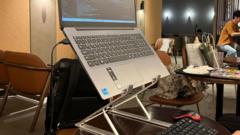In South Korea’s bustling Daechi neighborhood, local cafe owner Hyun Sung-joo faces an ongoing challenge with a cultural trend known as “Cagongjok.” This term refers to predominantly young individuals who camp in cafes for hours, often with multiple electronic devices. A recent example saw a customer occupy a seat all day with two laptops and a six-port charger, forcing Hyun to block off power outlets due to the strain on his business model, which struggles with high rental costs.
This “Cagongjok” phenomenon has reached a level unseen in other countries, where cafe-goers combine work and study in a shared environment. The coffee giant Starbucks recently announced guidelines aimed at curbing extreme behaviors among this group, such as occupying tables with large setups or leaving seats unattended for extended periods. While the chain reassured customers they wouldn't be asked to leave, it emphasized the commitment to a comfortable environment for all patrons.
In the Gangnam district, the ambiance in Starbucks remains predominantly calm, with students engrossed in their work. An 18-year-old preparing for her university entrance exam shared she often spends nearly twelve hours a day in Starbucks, leaving her belongings unattended during breaks. Although some customers reported minimal immediate change since the implementation of guidelines, the mix of reactions reflects a broader societal conversation around the evolving use of public spaces.
Many patrons welcome Starbucks’ new approach as a necessary measure to re-establish a balanced patron experience after complicated dynamics emerged between “Cagongjok” users and casual visitors. Others feel the guidelines represent an overreach of authority and a departure from the traditionally relaxed cafe culture.
The rise of coffee shops in South Korea reflects broader societal trends, with coffee shops increasing by nearly 48% in five years as reported by the National Tax Service. A survey indicated that 70% of Gen Z respondents work or study in cafes at least once a week, blending social needs with academic pursuits.
While many cafes continue to embrace a culture of inclusivity, some have opted for stricter policies; one cafe in Jeonju even enacted a “No Study Zone” to curb seat monopolization. This dynamic poses challenges for cafe owners trying to accommodate a modern customer base while maintaining a viable business.
The motivations behind “Cagongjok” delve into deeper societal issues. As Professor Choi Ra-young from Ansan University notes, this trend reflects a hyper-competitive society wherein young people seek comfort and grounding in communal spaces, often feeling unsafe or stifled at home. Advocates for change call for a reevaluation of public space design to accommodate such cultural phenomena while minimizing disruption for all patrons.



















